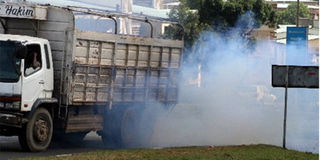Breaking News: Old Kijabe dam tragedy: Death toll rises to 45
Air pollution killing 14,300 Kenyans annually: report

Exhaust fumes engulf a Nairobi street. Almost any measure which will significantly reduce harmful vehicle exhaust emissions is a good thing. FILE PHOTO | NATION MEDIA GROUP
What you need to know:
- In Kenya, according to a United Nations report of 2016 titled “Actions on Air Quality”, at least 14,300 Kenyans die every year from health conditions which can be traced back to indoor air pollution with pneumonia cited as one of the biggest killers associated with air pollution.
- In the report, "Inheriting a sustainable world: Atlas on children's health and the environment", the WHO said harmful exposure can start in the womb, and then continue if infants and toddlers are exposed to indoor and outdoor air pollution and second-hand smoke.
At least 1.7 million children under the age of five die every year due to unhealthy or polluted environments, a report has revealed.
The World Health Organization (WHO) report released on Monday revealed that a quarter of all global deaths of children under five are caused by dirty and polluted environments including dirty water and air, second-hand smoke and a lack of adequate hygiene.
In Kenya, according to a United Nations report of 2016 titled “Actions on Air Quality”, at least 14,300 Kenyans die every year from health conditions which can be traced back to indoor air pollution with pneumonia cited as one of the biggest killers associated with air pollution.
WHO Director-General Margaret Chan said that lack of clean air and water can lead to fatal cases of diarrhoea, malaria and pneumonia. This also exposes children to harmful chemicals through food, water, air and products around them.
"A polluted environment is a deadly one, particularly for young children. Their developing organs and immune systems and smaller bodies and airways, make them especially vulnerable to dirty air and water,” said Ms Chan.
In the report, "Inheriting a sustainable world: Atlas on children's health and the environment", the WHO said harmful exposure can start in the womb, and then continue if infants and toddlers are exposed to indoor and outdoor air pollution and second-hand smoke.
This increases their childhood risk of pneumonia as well as their lifelong risk of chronic respiratory diseases such as asthma.
Air pollution also increases the lifelong risk of heart disease, stroke and cancer, the report said.
The report also noted that in households without access to safe water and sanitation, or that are polluted with smoke from unclean fuels such as coal or dung for cooking and heating, children are at higher risk of diarrhoea and pneumonia.
Interestingly, air quality monitoring in Kenya is practically non-existent, although a few cases of monitoring have happened after complaints from the public, only to be abandoned later on.





